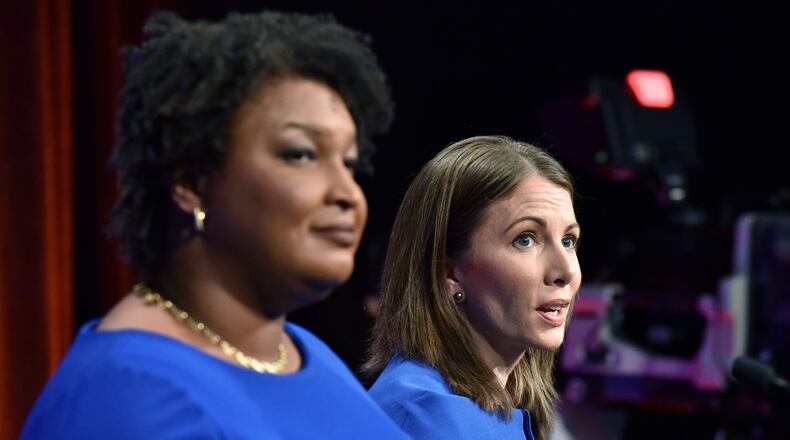Just minutes into Tuesday’s Democratic debate, the fault lines over the HOPE scholarship erupted again. Not surprisingly, the rift over the lottery-funded program that has helped define the race for governor also was a dominant theme in the televised showdown.
Stacey Evans slammed her rival, Stacey Abrams, over her alliance with Republicans over cuts to the HOPE scholarship. Abrams hit back by criticizing her rival for “scaring” African-American students about the depth of the cuts.
The two candidates have clashed for nearly a year on issues such as economic policy, gun control decisions and tax cut plans. But the central divide at the Atlanta Press Club debate was a staunch disagreement over the HOPE scholarship.
Evans, a former state lawmaker, has relentlessly assailed her rival for supporting the 2011 Republican-backed legislation to cut the lottery-funded program’s awards when she was the House’s top Democrat. She claims Abrams betrayed Democrats by “gutting” the program.
“I’m not out to scare anyone,” Evans said. “There was a gap that was created that cannot be filled.”
Abrams countered that she negotiated with Republicans to prevent deeper cuts to the scholarship, which is awarded to students with “B” averages. And she launched her own attack, slamming Evans for voting for a GOP-backed initiative to grant the state more power over struggling schools.
“I understand that she now stands on the side of public education,” Abrams said of Evans, who has said that vote was a mistake. “But I never wavered, and I’m the only one to say so.”
The May 22 race has attracted a burst of national attention. Both are competing to be the first woman elected to Georgia’s top job, while Abrams would also be the first black woman elected governor in the U.S.
The two have widely different political strategies, with Evans focusing on a traditional campaign of winning over moderates and independents while Abrams aims to mobilize left-leaning minority voters who feel disenfranchised.
“I’m running a strategy that assumes there is no Democratic base but assumes there’s an opportunity for a coalition that looks like Georgia,” Abrams said. “We have to knit together a coalition for Democrats to win.”
A ‘champion’
Trailing her opponent in public polls, Evans came out with an aggressive streak.
She criticized Abrams for not endorsing Democrat Keisha Lance Bottoms in December's mayoral runoff in Atlanta against Mary Norwood, who ran as an independent. And she questioned Abrams' role in a startup that contracted with the state while she was in the General Assembly.
“Georgia families need a champion at all times, not just when it’s convenient,” Evans said. “Ms. Abrams was compromised, and we didn’t even know it.”
Abrams countered that she played no role in the state contracts. And while she swiped at Evans throughout the event, she also peppered her opponent with politically neutral questions about the closure of military bases and the message she would send to young women seeking office.
When Abrams said her opponent “deserves all the credit — and she should share the credit” for her legislative accomplishments, Evans shot back she didn’t need her former colleague’s assistance in pushing for proposals to help tech school students.
“Ms. Abrams tries to take credit for the hard work I put in,” Evans said. “I didn’t need anyone to tell me to fight to save the HOPE scholarship program.”
The primary has pulled Evans and Abrams further to the party's left flank as they both embrace progressive issues, such as broad new firearm restrictions, Medicaid expansion and the decriminalization of marijuana. And in the closing days of the race, both have tried to present themselves as the most ardent progressive.
Abrams said she’s excited to be the “standard-bearer not just for progress but for opportunity” and said she would strongly oppose a proposal by Lt. Gov. Casey Cagle — the front-runner on the Republican side of the governor’s race — to send Georgia National Guard to the U.S.-Mexico border to combat illegal immigration.
“Progressive values belong to everyone,” she said.
Evans, meanwhile, shifted back to her favorite theme when talking about her appeal to the Democratic base.
“The real differences in this race come from our stances on dedication to true progressive issues,” Evans said. “One of us fought to save HOPE, one of us gutted it.”
2018 campaign
The Atlanta Journal-Constitution is covering the issues and candidates ahead of Georgia’s primary on May 22. The AJC has already produced stories looking at gun rights, tax policy and how President Donald Trump factors in the stances candidates are taking. It also has conducted polls to determine what’s most important to voters from the two major political parties. Look for more at PoliticallyGeorgia.com.
About the Author






